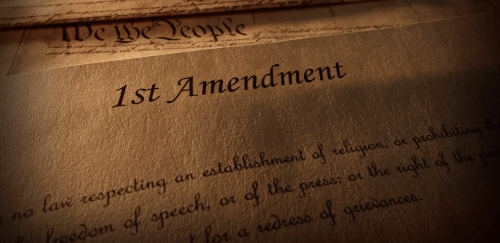
First Amendment FAQs
Congress shall make no law respecting an establishment of religion, or prohibiting the free exercise thereof; or abridging the freedom of speech, or of the press; or the right of the people peaceably to assemble, and to petition the Government for a redress of grievances.
Commonwealth University’s premises are public property, and we do not have the authority to deny access to any individual or group. The First Amendment of the U.S. Constitution prohibits Commonwealth University, as a public institution, from banning speech based on its content or viewpoint, no matter how repugnant such speech may be.
The expression of viewpoints by visitors to campus does not equate with endorsement of those views by the university. The university leadership recognizes that the views expressed by some groups are highly offensive, and not consistent with the values of Commonwealth University.
Commonwealth University is committed to academic excellence, equal opportunity, and freedom from discrimination for all individuals.
As we have seen many times in our society, directly engaging controversial groups serves only to empower them. While we understand the urge of students to confront controversial speech directly, we encourage them to express their opposition in peaceful and constructive ways that call attention to the values that guide them as productive members of society.
Commonwealth University strives to provide a safe and inclusive environment. That environment serves us best when members of our campus community can exchange differing viewpoints civilly and safely for all members of the community.
FAQs
The First Amendment protects several basic liberties from government interference. It prohibits any laws that:
- Establish a National Religion
- Endorse or support one religion over another
- Impede the free exercise of religion
- Abridge the freedom of speech
- Infringe upon the freedom of the press
- Interfere with the right to peaceably assemble
- Prohibit citizens from petitioning for a governmental redress of grievances
The following forms of speech are not protected by the First Amendment:
- Obscenity (e.g., child pornography)
- Defamation/libel
- Fighting words, i.e. abusive language, exchanged face to face, which would likely provoke a violent reaction or immediately lead to a fight. Mere offensiveness does not qualify as fighting words.
Incitement to immediate violence or lawless action. Words which are intended and likely to incite the action and in fact, do produce such action. - Threats of violence. This encompasses those statements where the speaker means to communicate a serious expression of an intent to commit an act of unlawful violence to a particular individual or group of individuals. Intimidation is a type of true threat, where a speaker directs a threat to a person or group of persons with the intent of placing the victim in fear of bodily harm or death.
- Illegal Conduct. Illegal conduct is not protected because it is not speech and it violates the law. Examples follow:
Obstruction of a police officer - Willful disturbance of any lawful meeting (must "substantially impair" the meeting by intentional conduct in violation of implicit or explicit rules for the meeting that violator knew or should have known).
- Unlawful assembly and refusal to disperse.
- Vandalism and defacing property of another.
- Disturbance by loud and unreasonable noise.
- Trespass.
Civil disobedience is non-violent unlawful action as a form of protest. Civil disobedience is not protected under the Constitution. The Constitution does not guarantee any right to engage in civil disobedience, as it involves the violation of laws or regulations-without incurring consequences. Civil disobedience may have a negative effect on the protected interests of others and may interfere with University business or threaten public safety or University assets, in ways that require the University to act to protect those other interests.
Public expression in the form of freedom of speech, expression and assembly is a constitutionally protected right and an essential element in the marketplace of ideas of higher education. The University is obligated to create an environment where free speech and higher learning will enhance its mission of learning, discovery and engagement. In the spirit of open discussion and freedom of expression, any individual or group may use specific campus grounds, including outside public areas open to the public such as sidewalks, lawns and plazas, to exercise this constitutionally protected right.
Hate speech is speech that offends, threatens or insults people or groups, based on race, color, religion, national origin, gender, sexual orientation, disability or other traits. Even if speech is hateful or offensive, it is still protected under the First Amendment. However, a person's conduct or behavior can be prohibited if it is verbal abuse, intimidation, coercion or bullying which is sufficiently several, persistent or pervasive so as to interfere with or limit a student's ability to participate in or benefit from the education services, activities or opportunities offered by the University.
If you believe you have been subjected to any verbal abuse, intimidation, coercion or bullying which is interfering with or limiting your ability to participate in or benefit from the education services, activities or opportunities offered by the university, report the incident or conduct to law enforcement, a Commonwealth University Police Department, or the Title IX office.
If a person's conduct or behavior is verbal abuse, intimidation, coercion or bullying which is sufficiently several, persistent or pervasive so as to interfere with or limit a student's ability to participate in or benefit from the education services, activities or opportunities offered by the University, this behavior could rise to the level of harassment under University rules and regulations as well as federal law.
The primary function of Commonwealth University is to serve as an inclusive comprehensive public university that prepares students for personal and professional success in an increasingly complex global environment. To fulfill its educational mission, the University must respect and uphold the full panoply of, sometimes, conflicting, rights of students, staff, and faculty granted by the First Amendment of the United States Constitution and Article I, Section 7 of the Constitution of Pennsylvania.
The university supports the rights of students, staff, and faculty to individually and collectively engage in Expressive Activity. Such rights are equally extended to other University Community Members including individuals, Registered Student Organizations, University Departments, and Invited Guests.
This Policy on Time, Place, and Manner Guidelines for the Exercise of Expressive Activities establishes guidelines to assure that Expressive Actions do not unreasonably interfere with University Operations, undermine the protected speech of others, or present a threat of imminent harm to others or University Property. This policy defines different areas of campus as Designated Public Forums or Designated University Forums and explains how speech protections apply to different Speakers in those areas. Importantly, through this policy, the University regulates the time, place, and manner of Expressive Actions in a content-neutral manner as a legitimate way to fulfill its educational mission.

